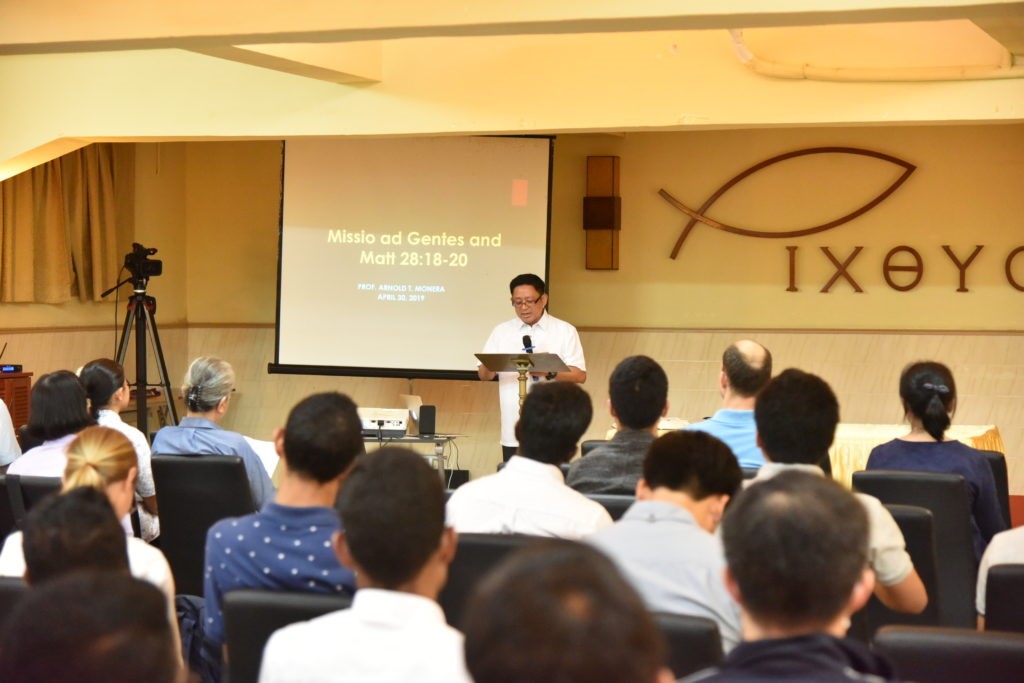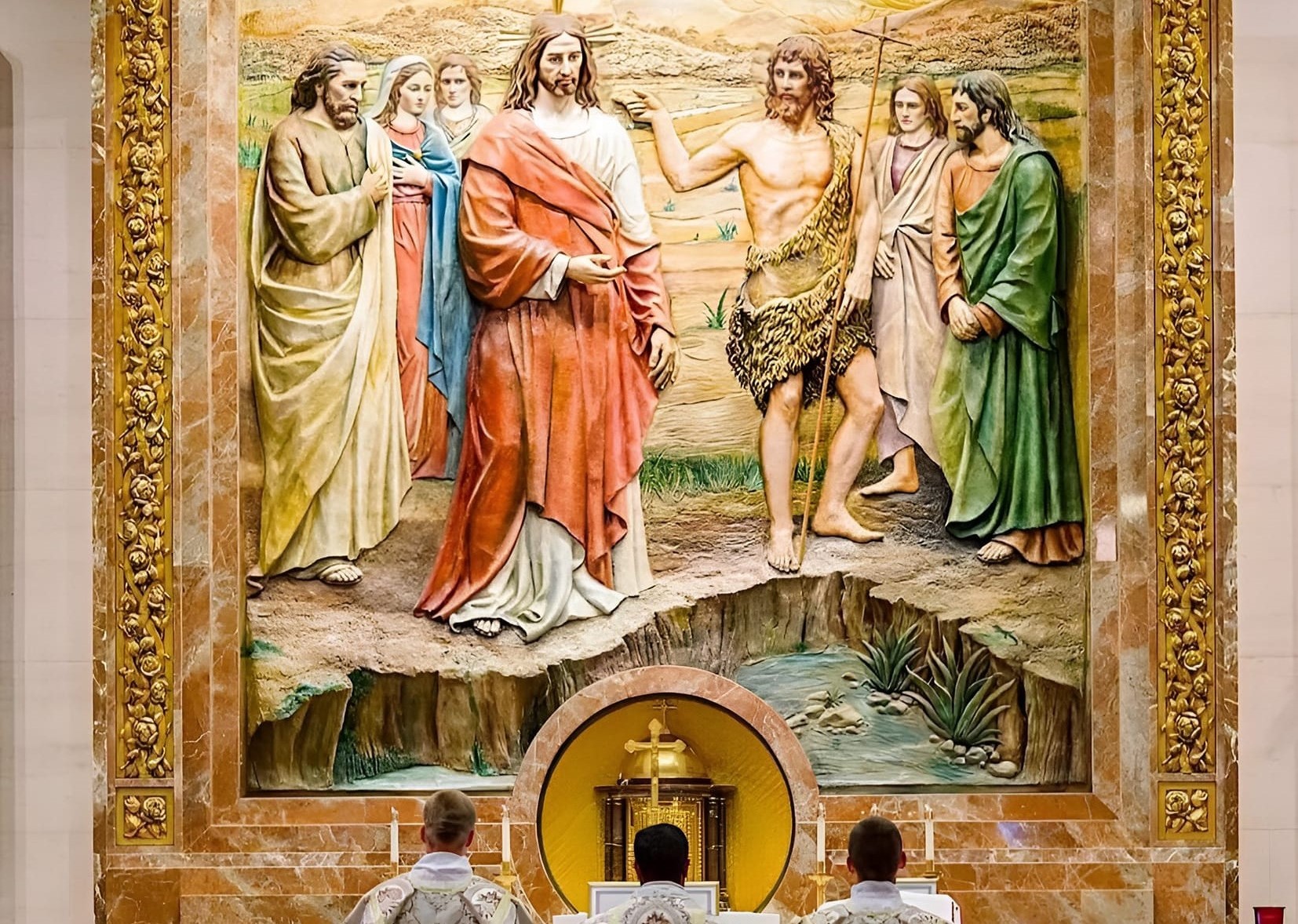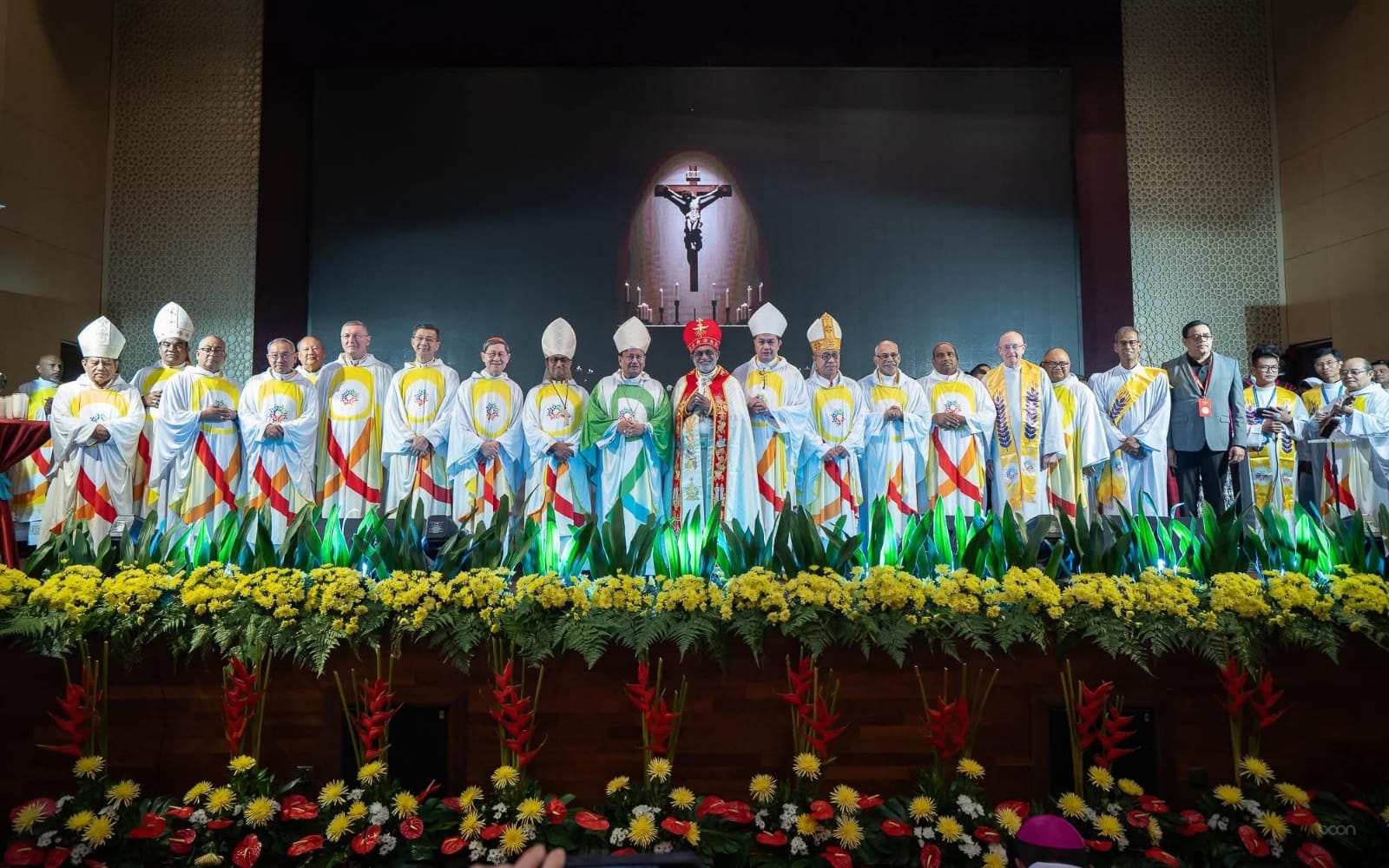– Fr Franz Gassner
Many people turned up for the 2nd Maximum Illud Lecture on April 30th 2019 at the Gratia Hall of the St. Joseph Seminary. These lecture series mark the centenary of the important document Maximum Illud on the Church’s missionary activity by Pope Benedict XV, published in 1919. Prof. Arnold Monera, former Dean of FRS and now Visiting Academic, explored the biblical foundation and understanding of mission by reflecting on the famous passage in Matthew 28:18-20.
V. 18a: And Jesus approached and said to them,
V. 18b: All authority (exousia) in heaven and earth has been given (edothē) to me.
V. 19a: As you go, therefore, make disciples (matheteusate) of all nations (panta ta ethnē),
V. 19b: baptizing (baptizontes) them,
V. 19c: in the name of the Father and of the Son and of the Holy Spirit,
V. 20a: teaching (didaskontes) them to observe all that I have commanded you;
V. 20b: And behold, I am with you always [all days],
V.20c: until the end [close] of the age.
Prof. Monera began his lecture by describing Matt 28:16-20 as an important missionary paraenesis or exhortation. Because of the high prominence given to the passage, it has been called by various names: “Great Commission,” “Ultimate Commission,” “Mission Mandate.” The passage has been used as a proof-text for answering the question, “Why Christian mission?” Even the documents of the Catholic Church on Mission love to quote or allude to Matt 28:16-20.
Biblical scholars of the twentieth and twenty-first centuries have viewed the relation of the so-called “Great Commission” vis-à-vis the whole Gospel of Matthew in various ways. Matt 28:16-20 has been seen as Matthew’s “table of contents” located at the end (Peter F. Ellis), “the theological program of Matthew” (J. Blank), “the digest and telos of the work” ( D. Kupp), “the most important concern of the Gospel” (H. Kosmala), “dynamic conclusion” of the Gospel (R.T. France), “the compact summary of the Gospel” (Soares-Prabhu). Thus, the “Great Commission” is essential in understanding the whole Gospel since it was a meticulously formulated passage composed by Matthew as a finale to his Gospel. It is key to the understanding of the whole book.
Prof. Monera emphasized that the Great Commission cannot simply be lifted out of Matthew’s Gospel in isolation and cannot be understood apart from the Matthean community for which the Gospel was written. The Gospel of Matthew is essentially a missionary text. Because of his missionary vision, the evangelist set out to write a gospel, not primarily to compose a “life of Jesus” but to provide guidance to a Jewish Christian community living in a predominantly Gentile environment in Antioch (Syria) on how it should understand its calling and mission. The Gospel was written after the destruction of the Temple of Jerusalem by the Romans. During this turbulent and challenging time and context – politically and religiously – Matthew set out to strengthen his frightened, confused and hesitating community. By then a bitter polemic had developed between Pharisaic Judaism and Jewish Christianity. The community was experiencing a crisis of unprecedented magnitude as regards its self-understanding; it was a community cut off from its roots, rejected by their compatriots, a divided community separated and disliked by her orthodox Jewish mother community. Matthew’s intention was not just to cope with the new pressures they faced, but to assist them in developing a missionary ethos that will match the challenge of a new epoch (Bosch). Matthew desired his community to regard itself boldly and consciously as the church (ekklēsia) of Christ.
It is against this backdrop that we have to see the apparent contradictions in Matthew’s Gospel. On one hand, it is the most Jewish of all the Gospels; on the other hand, Matthew’s gospel consistently and systematically engages in polemics against the Jews and their leaders. The evangelist deliberately included both sets of conflicting sayings in the service of the overall purpose of his gospel. While in the beginning of Jesus’ ministry the disciples were restricted to cater only to the “lost sheep” of Israel (Matt 10:5 and 15:24), now at the Ultimate Commission the disciples are to share their discipleship not only with their fellow Jews, but also to all the nations (panta ta ethnē). To exclude one group from the other seems to contradict the Risen Lord’s claim of the universal authority. What makes it new is the universal extension of Jesus’ authority: “All authority (exousia) in heaven and on earth has been given to me” (Matt 28:18b) – a clear allusion to Daniel 7:14.
Thus, the Great Commission in Matt 28:18-20 marks the beginning of a new chapter in the history and identity of the Matthean community. They are commissioned to “make disciples”. In his textual analysis, Prof. Monera highlighted four verb forms in the Great Commission: going (poreuthentes), making disciples (matheteusate), baptizing (baptizontes), and teaching (didaskontes). Of these four words, the verb matheteuein (“to make disciples”) is central and is the only one which is imperative. The other three words are participles (“going,” “baptizing,” and “teaching”), hence, auxiliary in nature, that is, subordinate to the finite imperative matheteusate. “Make disciples” is the principal verb of the Great Commission and the heart of the commissioning. Literally, Jesus is saying, “As you go, therefore, make disciples of all nations, baptizing them … teaching them….” When this is properly understood, a different picture of mission emerges. Mission is bringing people to Jesus as the Sovereign Lord of heaven and earth. Mission, then, loses its preoccupation with the geographical component. All of us, wherever we are, can be missionaries as we are all called to form a community of disciples (the ekklēsia) who place their trust in the Lord fully and follow his example of love, faith, and hope. Becoming thus the “salt of the earth” (Matt 6:13) and the “light of the world” (Matt 6:14) will attract all nations, peoples and transform mission.
The final part of the Ultimate Commission is the Sovereign Lord’s blessed assurance that he will be with his church always “until the end of the age”. This promise serves as an inclusio with the name “Emmanuel” (“God with us”) in Matt 1:22-23. While in the beginning of the Gospel Jesus’ presence was promised primarily to Israel, here at the end it pertains to all disciples wherever they may be. The promise of “until the end of the age” envisions an abiding presence of the risen Lord among Christians.


 Follow
Follow


